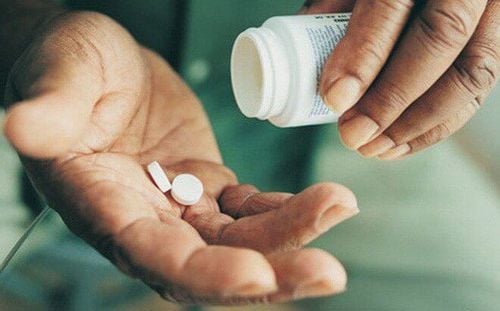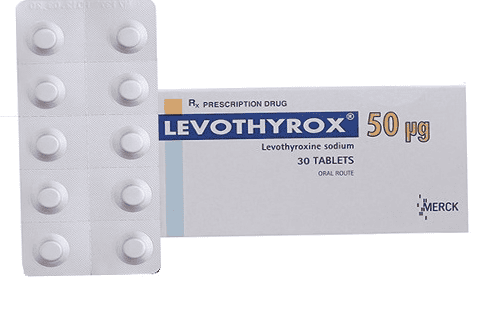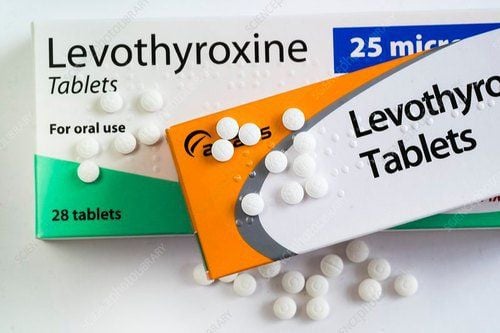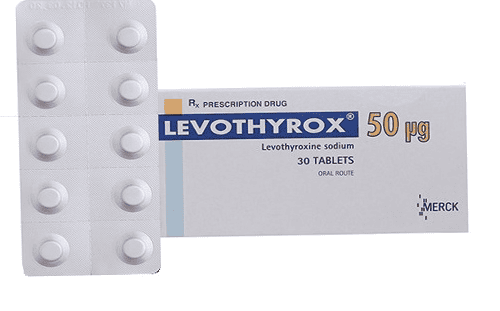This is an automatically translated article.
Levothyroxine is commonly used to treat hypothyroidism (hypothyroidism) by replacing or supplementing the body's thyroid hormone.1. Designation
What is Levothyroxine used for?Levothyroxine works to replace or provide additional thyroid hormone (usually secreted by the thyroid gland). Low thyroid hormone levels can be caused by a natural decrease or by damage to the thyroid gland by radiation/medication or surgical removal. Maintaining adequate levels of thyroid hormone in the body is extremely important for mental and physical functioning. In children, thyroid hormone helps children develop normally mentally and physically.
What does levothyroxine treat?
In addition to hypothyroidism, Levothyroxine is also used to treat other types of thyroid disorders (such as certain types of goiter, thyroid cancer). However, this medication should not be used to treat infertility unless low thyroid hormone is the cause of the infertility.
2. Dosage and usage
Swallow the medicine whole if you are taking it in capsule form. Do not split the medicine, but crush or chew it. For infants and children who cannot swallow capsules whole, Levothyroxine tablets should be used. If infants and young children still cannot swallow the tablets whole, crush them and mix them with 1-2 tablespoons (about 5-10ml) of water and give them slowly. The medicine should not be prepared in advance or mixed with soy formula c . Please consult your doctor for more information. Dosage is based on the patient's age, medical condition, weight, laboratory results, and response to treatment; Keep taking Levothyroxine regularly to get the most benefit from it. To make it easier to remember your dosing schedule, take your pills at the same times each day; Do not stop taking the medicine on your own without consulting your doctor. In many cases, thyroid replacement therapy is lifelong. There are many different types of levothyroxine, so do not change your medication without consulting your doctor. Certain medications such as Cholestyramine, Colesevelam, Colestipol, antacids, Sucralfate, Simethicone, Sodium polystyrene sulfonate, Calcium tablets, , Orlistat, Sevelamer, Lanthanum, ..) can decrease the amount of thyroid hormones. thyroid is absorbed into the body. So if you are taking these medicines, divide and take at least 4 hours apart from Levothyroxine. When low thyroid hormone in the body is low, the patient may have signs such as fatigue, muscle aches, constipation, dry skin, weight gain, slow heart rate and sensitivity to cold. If treatment does not improve or worsens, notify your doctor immediately;

Người bệnh uống thuốc bằng cách nuốt toàn bộ viên nang
3. Undesirable effects
Like many other drugs, Levothyroxine can also bring some side effects such as:
During the first few months of treatment, patients may have signs of hair loss. However, this is only a temporary sign when the body has not adapted to the drug. If this side effect persists and gets worse, tell your doctor right away. High levels of thyroid hormone can lead to a number of serious reactions such as: increased sweating, sensitivity to heat, changes in mood, emotions (anxiety, restlessness), fatigue, tremors, and diarrhea. bleeding, headaches, shortness of breath, aches and pains, and easy fractures. Get medical attention right away if you experience these rare but serious side effects of increased thyroid hormone such as: chest pain, irregular heartbeat, swelling of hands/ankles/feet, seizures. Not everyone taking Levothyroxine will experience side effects, and serious reactions to this drug have been reported rarely. However, if you see signs such as: rash, itching, swelling in the face/tongue/throat, severe dizziness, trouble breathing; Please notify your doctor promptly and seek medical help as soon as possible.
4. Caution
Before taking Levothyroxine, be aware of the following:
If you are allergic to it or any other allergic condition, tell your doctor immediately. Talk to your doctor about your patient's medical history, especially problems with increased thyroid hormones (thyrotoxicosis), heart disease, decreased adrenal gland function, heart disease (coronary artery disease, disorders). heart rate), high blood pressure, diabetes. For people with diabetes, this medicine may affect blood sugar levels. It is advisable to check and monitor your blood sugar regularly and to inform your doctor about these reactions. If blood sugar is high, the person will often feel thirsty, need to urinate, shiver, sweat abnormally, dizzy or hungry. The doctor may adjust the patient's diabetes prescription, exercise regimen, or diet. Before surgery, it is necessary to inform the doctor about the products the patient is using (including over-the-counter drugs, prescription drugs and herbal products); Children may be more sensitive to drug reactions to signs such as: headache, vision changes, hip/leg pain. High thyroid hormone levels can also lead to decreased bone growth and reduced height in adulthood. Older adults are also more sensitive to the side effects of the drug, especially fast, pounding, irregular heartbeats. Levothyroxine can be used during pregnancy. However, tell your doctor if you are pregnant as your dose may need to be adjusted. The medicine passes into breast milk but is unlikely to harm a baby. Women who are breast-feeding should consult their doctor before taking this medicine.

Người bệnh gặp tình trạng dị ứng sau uống thuốc cần báo với bác sĩ điều trị ngay
5. Drug interactions
Drug interactions can change how a drug works or increase the risk of serious side effects. Therefore, the patient needs to inform the doctor about all the medicines he is taking. Also, do not use, stop, or change the dose of any medication without your doctor's approval.
Some drugs can interact with Levothyroxine drugs such as Warfarin, Sucroferric Oxyhydroxide, Digoxin.
6. Some Notes
Overdose : If you use too much Levothyroxine, have serious symptoms such as fainting or difficulty breathing, need to take the patient to the emergency room immediately. Symptoms of an overdose include fast, irregular heartbeat, seizures, loss of consciousness, and confusion. Missed dose: If you miss a dose, take it as soon as you remember. If it is almost time for your next dose, skip the missed dose and do not double your dose. If more than 2 doses are missed, ask your doctor for specific instructions; Storage: Store the drug at room temperature, away from light and moisture. Medicines should not be stored in the bathroom. Keep medication out of reach of children and range of pets.
Please dial HOTLINE for more information or register for an appointment HERE. Download MyVinmec app to make appointments faster and to manage your bookings easily.










